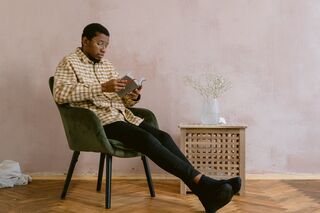Health
The Case for Bibliotherapy
In a time of therapeutic advances, books remain a highly effective intervention.
Posted March 30, 2022 Reviewed by Kaja Perina

There is currently widespread interest in providing mental health interventions that can scale, meaning interventions that can be provided efficiently to many people at once, ideally at a relatively low cost. There are several motivations for this: some of them are economic, while others are moral. For one thing, mental health is a major global health issue, and there are not nearly enough practitioners to provide individual treatment to all the people who need it.
When many of us think about the question of scalability, we think about new technologies: apps that guide someone through meditation, or connect them with a (human) therapist, or perhaps even make use of artificial intelligence to provide a therapy-like interaction with a therapist-like being. These technologies are tremendously exciting. But the appeal of novelty can tend to overshadow the usefulness of older technologies.
Books, in particular, are a (comparatively) old technology that have been shown to be a quite effective intervention. A key text here is Feeling Good: The New Mood Therapy. Published by the psychiatrist David Burns in 1980, this book introduces the reader to Cognitive Behavioral Therapy (CBT) for the treatment of depression. Subsequent decades have seen the introduction of CBT guides for a range of conditions, as well as guides that draw on newer modalities such as Dialectical Behavior Therapy (DBT) and Acceptance and Commitment Therapy (ACT). Books like this have made bibliotherapy – by which I mean the assignment of structured readings in lieu of intensive therapy – a realistically available treatment option for many.
Despite this wealth of resources, the idea that books alone can have substantive effects on mental health has not always been readily adopted. Indeed, some of the earliest rigorous studies of bibliotherapy in the 1980's used bibliotherapy as a control group against which more intensive forms of therapy could be compared. It then turned out that the results for the control were just about as good as the results for individual and group therapy – not because the individual and group therapy was ineffective, but because the bibliotherapy was so effective.
Subsequent research has confirmed these initially surprising results. The evidence for the effectiveness of these interventions is, by any reasonable standard, quite strong. One 2004 meta-analysis compares the effects of cognitive bibliotherapy for depression – that is, the assignment of a CBT book with comparatively minimal therapist intervention – with the effects of traditional CBT psychotherapy. The authors find that the effect size of bibliotherapy (relative to non-treatment) is sizable, and in fact is approximately the same as the effect size of traditional CBT psychotherapy. Remarkably, the authors found no additional benefit when bibliotherapy was supplemented with group therapy. The book treatment alone appears to be the main driver of the effect. Other studies have tended to find positive effects for bibliotherapy, though with disagreements about the size and the source of those effects.
This research provides defensible support for a claim that I want to call the 'Book Hypothesis.'
The Book Hypothesis
For some common mental health conditions, assigning an appropriate book to a patient, with minimal supervision, can be about as effective as individual psychotherapy.
We can reasonably disagree about the details of the Book Hypothesis. Which mental health conditions does it apply to? (There is a good case for mild depression, but it would be implausible for more severe mental health conditions.) How much supervision counts as minimal? And precisely how close is bibliotherapy to individual therapy in effectiveness? All these are questions that the Book Hypothesis leaves open.
But, even at this level of generality, the truth of something like the Book Hypothesis would have quite radical implications for mental health practice and its evaluation.
First, the Book Hypothesis should make us slightly more suspicious of the value of highly personalized and idiosyncratic forms of psychotherapy. I have heard otherwise thoughtful psychoanalysts speak pejoratively of "manualized" treatment. But, if we want to provide mental health care for all the people who need it, being manualized is a good thing. Even better if all we need is the manual itself.
Second, the Book Hypothesis is relevant to the evaluation of some of the new technologies mentioned above. Often apps and other technologies are compared to individual therapy; in comparison, it is said, they offer a much more cost-effective and scalable method for mental health care. But this is not always the most salient comparison. Books are also relatively cheap and easily distributed. Thus, the big question for new mental health technologies may not be whether they are better than a therapist, but whether they are better than a book.
Third, for those of us interested in addressing the problem of global mental health, books may be an underestimated resource. The effectiveness of bibliotherapy for mental health is a remarkable fact, marking a crucial asymmetry between the treatment of mental health and other aspects of the global health burden. The Book Hypothesis suggests it is one that we should leverage (through routes such as publication, distribution, and translation) if we can.
Bibliotherapy is not as a cure-all. For one thing, the Book Hypothesis remains a hypothesis. It finds some support in the extant research, but this is an area where much more research is needed. For another, even if bibliotherapy is indeed highly effective, it cannot be a universal solution, if only for the simple reason that the global literacy rate is only about 85%, and closer to 60-70% in many developing countries. This means that, even if a strong form of the Book Hypothesis is true, bibliotherapy will inevitably leave many people out.
On the other hand, if some form of the Book Hypothesis is true, bibliotherapy has the potential to assist a vast number of people who currently receive no treatment at all. Anyone rightly concerned about the limited availability of mental health care, both in the United States and globally, has reason to think seriously about the considerable merits of bibliotherapy.
To find a therapist, visit Psychology Today's directory of providers.




